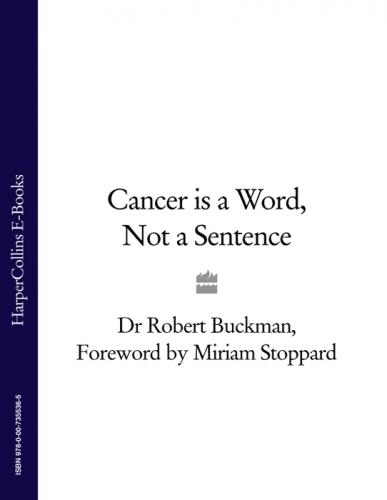Cancer is a word, not a sentence.
Dr Robert Buckman
Foreword by Dr Miriam Stoppard
With Major Contributions by Dr Pamela Catton and the Medical Staff of the Princess Margaret Hospital,Toronto, Ontario
This book is dedicated with deep, genuine respect and admiration to a man who combines careful research, vision and foresight with extraordinary compassion and humanity:
—DR JUDAH FOLKMAN
Table of Contents
Introduction A word, not a sentence.
Part One ‘What’s going to happen to me next?’
Part Two ‘What’s treatment like?’
Part Three ‘Isn’t there an easier way?’
Part Four ‘How do I get back on track?’
Part Five ‘Do I always have to have a positive attitude?’
Part Six ‘What can I do to help myself?’
Appendix II ‘Where can I get more help?’
I don’t have to read this book to applaud it. I applaud the idea of it. I applaud the fact that Dr Buckman wants to change the way we talk, think and feel about cancer. He wants to give us a fresh, hopeful perspective about cancers. He wants us to use a different language to describe them so that we can be open and unafraid to discuss them. He wants to take away their unpredictability using science as his weapon. Reassuringly he explains that cancer is only a process like infection, inflammation and degeneration. Cancer displays a particular kind of behaviour, as do infection, inflammation and degeneration, that we can predict. This predictability makes it manageable.
This is a good news book. It’s also, literally, a lifeline. Rob Buckman is such an experienced oncologist and such a good doctor that he can get into the head of almost anyone with cancer and know instinctively what to say to them. He’s adept at coaxing cancer patients to confront their illness and realise that, in at least half of patients, it doesn’t kill. He changes our perception of the odds.
But the news is even better than that. For if you look at cancers with 20/20 vision and separate them into the myriad of different kinds that exist, you cut them down to size.
One of the most helpful ways to think of cancers is as a family, some members of which are relatively friendly, some are hostile and some are downright toxic. The helpful analogy that Dr. Buckman cites is another family—the family of virus infections. So for instance, the common cold virus and the flu virus are relatively benign family members and then we have the potential killers, relatives like the HIV/AIDS and Ebola viruses. It’s just the same with cancers.
I had a light bulb moment the first time Rob explained this analogy. I’ve never thought about cancers in the same way since and I hope it frees and empowers you, too.
Medical books on cancer abound but few concentrate on the all important job of putting the patient first; your feelings, your fears, your questions, your worst thoughts. Cancer affects us like nothing else does and Dr Buckman knows this. He starts by calming you down. He allows your rational mind to hold sway over your emotional mind. Gradually you get your bottle back and start taking charge of your illness. In restoring your mental and emotional equilibrium he gives you a firm sense of resolve to embark on the journey you’re going to travel. You feel in control again.
Dr Buckman and I share a journalistic approach to information. We believe that information is light. Without it, we’re in the dark, and for a cancer patient it’s a terrifying dark. Dr Buckman is only too aware of this and has written, as far as I know, the only practical guide to inform you about the full implications of your diagnosis.
His guide will illuminate and inform every step that you’ll be taking through diagnosis and treatment. This knowledge isn’t just liberating—it will restore and build your spirit and help you to cope. You’ll find a new strength to overcome the temporary mental paralysis that envelopes us all when we get seriously bad health news.
This knowledge truly is light and is the beginning of understanding. Without it none of us can cope.
Should I become a cancer patient this book will be my mentor, friend and counsellor. It will never leave my bedside table.
DR MIRIAM STOPPARD
INTRODUCTION A word, not a sentence.
Read this first—it will help you get your balance back
If you’re reading this book, you’re probably reeling.
Most people are knocked off balance and reeling when the diagnosis is a cancer. It’s the normal reaction: it’s what everybody experiences, and it’s why I’ve written this particular book, with the collaboration of my friend and colleague Dr Pam Catton and many other members of the medical staff of the Princess Margaret Hospital, Toronto, Ontario, in this particular way.
This book is going to do one specific thing for you: it’s going to help you get your balance back. It will do that by offering a steady hand that guides you and gives you a sense of direction.
The problem starts with the word cancer. There are so many overtones and associations attached, it is probably the most dreaded word in the English language. It brings with it, universally, queasy feelings of fear and doom. Many people describe the sensation as chilling, or as a sense of help-lessness, or even as a foggy feeling of mental paralysis. They experience a sense of unreality, and feel ‘this can’t be happening
